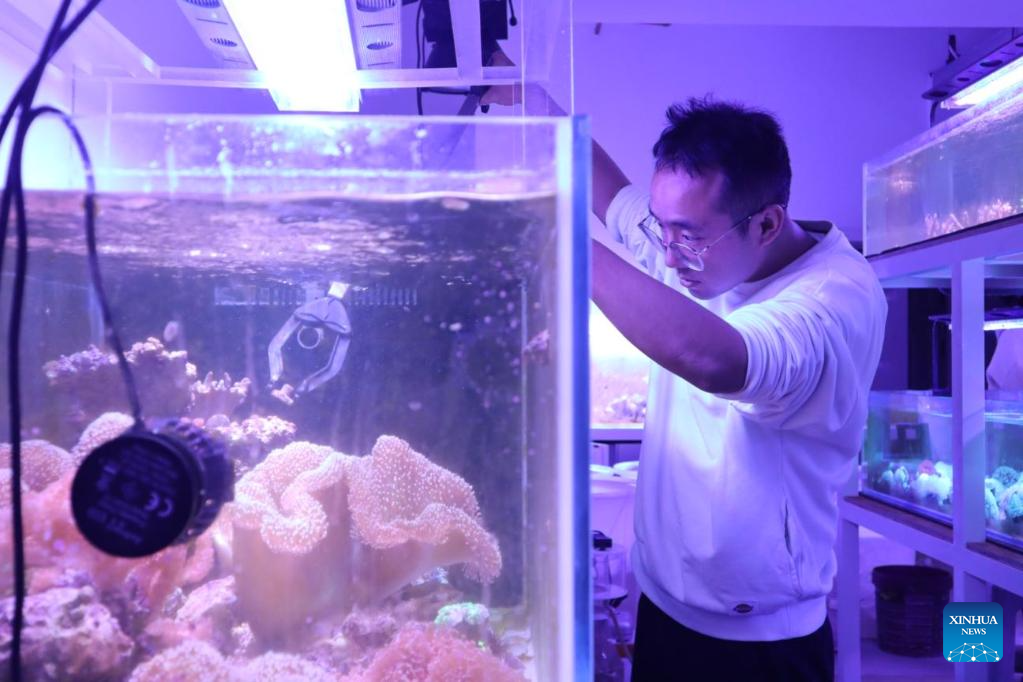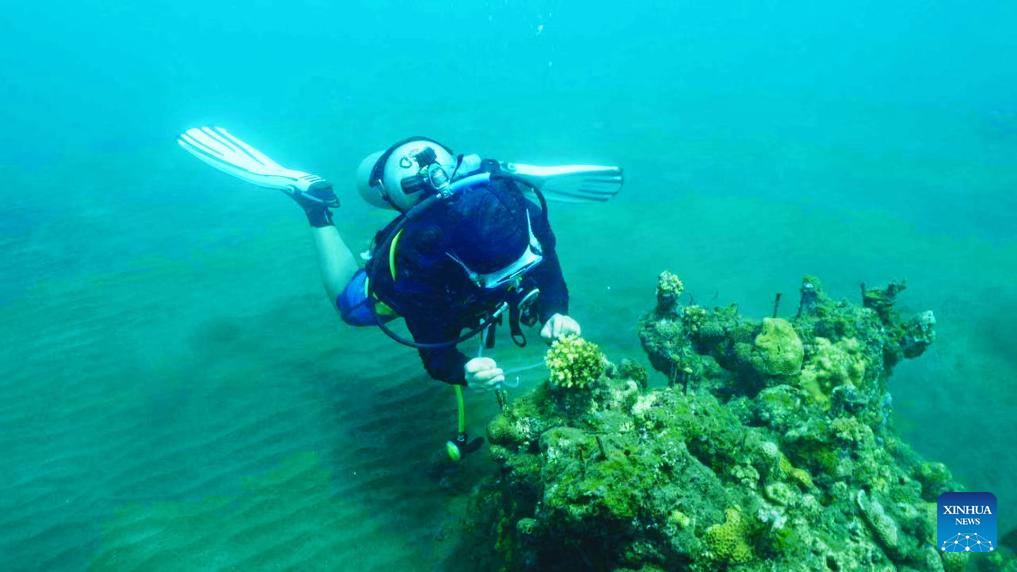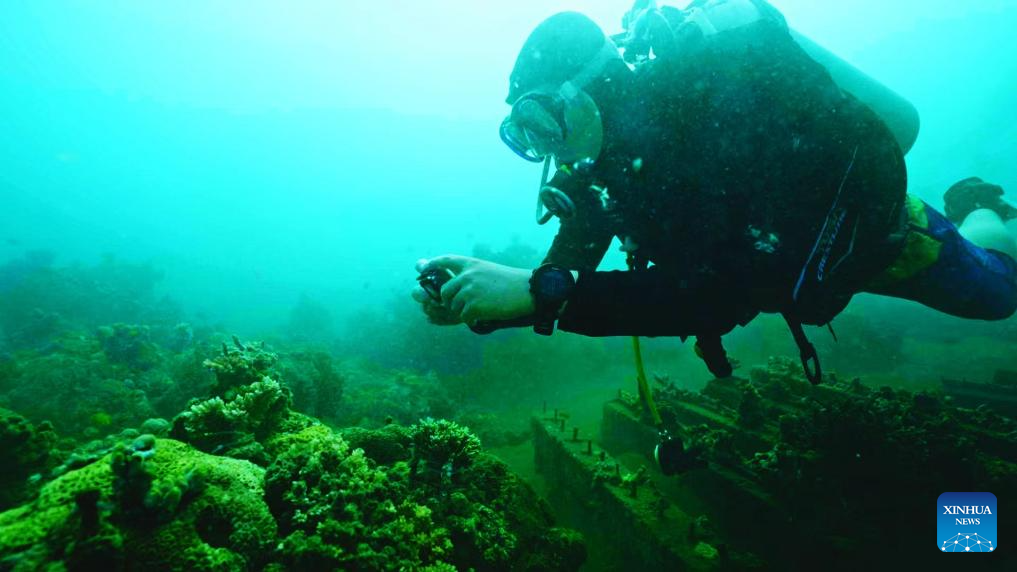
This photo taken with a mobile phone shows Luo Jie, an associate researcher from the Kunming Institute of Zoology, Chinese Academy of Sciences, collecting coral specimen in a laboratory of the institute in Kunming, southwest China's Yunnan Province, Jan. 17, 2024.(Xinhua/Yue Ranran)
KUNMING, March 12 (Xinhua) -- Luo Jie, an associate researcher from the Kunming Institute of Zoology, Chinese Academy of Sciences, is a keen diving enthusiast, which allows him to breed corals not only limited to his laboratory but also in real waters.
Luo still recalls the vast, colorful "undersea forests" he encountered nine years ago as a novice diver. However, the beautiful scenes have been long replaced by more and more pale coral "graveyards."
In the context of global warming, due to water quality changes and overfishing, one-fifth of the world's coral reefs have bleached and died since 2016, and the total area of coral reefs keeps shrinking according to scientists.
"Coral reefs cover less than 1 percent of the ocean, but shelter up to 25 percent of marine life. When coral reefs are destroyed, the marine environment is affected, and the marine life chain will be lost along with it," Luo said.
"Some scientists even predict that more than 70 percent of corals will bleach by 2030, and if nothing is done, all the reefs will be gone by 2050," he added.
How to keep corals from bleaching has then become his major subject. Luo began to focus on zooxanthellae, which can easily affect coral's life and death.
After five years of research and experiment, Luo designed a set of systems that can automatically control the physical and chemical environment of water and the type of biological community, which allows him to cultivate corals and fish in "seawater" simulated in his laboratory.
Mere restoring coral populations in the laboratory did not seem to satisfy the 38-year-old researcher.
In January 2020, Luo was invited to conduct some coral preservation research by a Chinese power plant in Bali, a renowned resort in Indonesia. Indonesia, with one of the world's richest coral reefs, is home to about 40,000 square kilometers of coral reefs, accounting for 16 percent of the world's total.
However, at that time, the local coral reefs north of Bali were bleaching and dying on a massive scale due to the El Nino weather pattern and overfishing. Luo and his team decided to transplant the corals underwater.
On June 8, 2023, about three years after their first experimental coral transplantation, Luo made a back-roll entry into the waters and directly swam towards their coral area. Thankfully, a vast expanse of corals of various colors greeted him, with abundant fish and shrimps living nearby.
Having confirmed that the corals have grown into strong "coral trees," Luo knew they had passed Mother Nature's mock exam. He shared the good news with the local fishermen who thanked the Chinese researchers for their efforts to bring the undersea garden back to life.
On June 13, 2023, local fishermen and some Chinese enterprises and research institutes began their relay of transplanting some 100 corals to the designated waters.
"It is a real race, with stringent time and handover requirements," Luo said, adding that the fragile coral polyps, which corals are grown from, are extremely demanding on the living environment, and thus they need to accurately control the temperature and humidity during transportation, as even a slight bump may cause the coral animals to break and die. "So every link, from land transportation, sea handover, to the final underwater planting, must be very careful."
Though it was a long haul to stay underwater for seven hours each day at a water temperature less than 30 degrees Celsius and even get hurt from the aggressive triggerfish, Luo found his efforts paid off generously.
"An Indonesian fisherman in his 70s told me that in the 1970s, they had few employment opportunities and could only make money by digging corals and hunting fish which was brutal. But now everyone understands that there is no fish without corals and the locals have learnt to protect them thanks to the coral protection and breeding lectures given by our Chinese researchers," Luo said.
Back in his laboratory, Luo has bred more than 200 varieties of corals over the past 15 years, to help better select specific varieties when restoring the reefs.
He is also building a new laboratory to provide a germplasm pool for the species in case any subspecies become extinct some day. In the future, Luo hopes to make his own documentary, illustrating breeding and transplanting techniques for more people in detail, so that the undersea beauty would never fade again. ■

Luo Jie, an associate researcher from the Kunming Institute of Zoology, Chinese Academy of Sciences, conducts coral preservation research in Bali, a renowned resort in Indonesia in June 2023.(Xinhua)

Luo Jie, an associate researcher from the Kunming Institute of Zoology, Chinese Academy of Sciences, conducts coral preservation research in Bali, a renowned resort in Indonesia in June 2023.(Xinhua)



